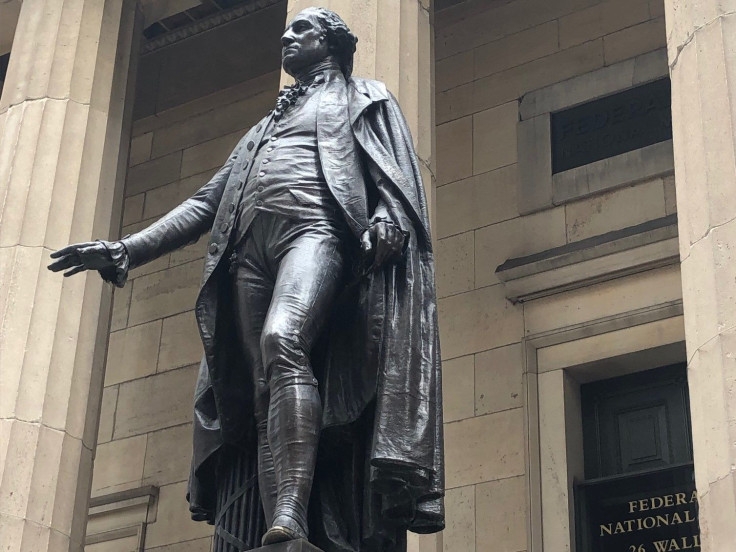Wednesday's Stock Market Close: US Equities Drop On Plunging Bank Earnings, Grim Economic Data

KEY POINTS
- Bank of America , Goldman Sachs and Citigroup each saw first quarter profits drop by at least 45%
- Retail sales plunged by 8.7% in March, the biggest decline ever recorded
- The Empire State Manufacturing Index for April plunged to minus-78.2
U.S. stocks dropped on Wednesday amid some gloomy economic numbers and first quarter profit declines among major banks – both reflecting how the coronavirus pandemic-related shutdown is hurting businesses and consumers.
The Dow Jones Industrial Average dropped 445.41 points to 23,504.35, while the S&P 500 fell 62.7 points to 2,783.36 and the Nasdaq Composite Index tumbled 122.56 points to 8,393.18.
Volume on the New York Stock Exchange totaled 4.39 billion shares with 470 issues advancing, 10 setting new highs, and 2,508 declining, with 21 setting new lows.
Active movers were led by General Electric (GE), American Airlines Group Inc. (AAL) and Delta Air Lines Inc. (DAL).
Bank of America (BAC), Goldman Sachs (GS) and Citigroup (C) each saw first quarter profits drop by at least 45%, while setting aside huge loan loss provisions for anticipated future defaults.
The S&P 500 Bank Stock Index dropped 5.93%.
“It’s really going to be about forward guidance,” said Erin Gibbs, president and CEO at Gibbs Wealth Management. “What we’re really going to be looking for is, are companies giving us an idea of when they think they’ll return to profitability, or, are they talking about more layoffs?”
Economic data were also gloomy.
The Commerce Department said on Wednesday that retail sales plunged by 8.7% in March, the biggest decline it has ever recorded, after dropping by a revised 0.4% in February.
“The economy is almost in free fall,” said Sung Won Sohn, a business economics professor at Loyola Marymount University in Los Angeles. “We will see the bottom when the coronavirus infection rates stabilize. It’s going to be a pretty deep bottom from which to come up.”
“In general consumer spending is going to look about as bad as it has ever been, although there will be some categories of resilience,” said Tim Quinlan, a senior economist at Wells Fargo Securities in Charlotte, N.C. “The panic buying at grocery stores cannot offset the retrenchment in spending that we will see in other categories.”
“If this is a precursor to what we can expect throughout the U.S. ... there’s no word for it,” said Quincy Krosby, chief market strategist at Prudential Financial. “[This data] reflects the complete shutdown of the economy. The question is how quickly can the economy come back?”
“Retail sales in the fourth quarter of 2008 fell over 8%, but that was over three months,” said Chris Rupkey, chief financial economist at MUFG Union Bank. “This [latest data] was just [over] one month... Consumers are hunkering down at home, only venturing out to go to the grocery store. It’s lights out today, and as far as we can tell, it’s going to be worse next month.”
The Empire State Manufacturing Index for April plunged to minus-78.2, its worst showing ever.
“The economy is clearly in ruins here,” said Rupkey. “Nobody is buying cars, down 25.6%, nobody is buying furniture, down 26.8%, and eating and drinking places were down 26.5%.”
Peter Cardillo, chief market economist at Spartan Capital Securities, grimly warned: “This [data] points to a very severe recession because this is just the beginning of a series [of economic numbers]. The consumer’s not spending. What does that mean for the market? I think it means we may have a short-term top here.”
Overnight in Asia, markets closed lower. China’s Shanghai Composite slipped 0.57%, Hong Kong’s Hang Seng dropped 1.19% and Japan’s Nikkei-225 fell 0.45%.
In Europe markets finished lower, as Britain’s FTSE-100 dropped 3.34%, France’s CAC-40 skidded 3.76% and Germany’s DAX fell 3.9%.
Crude oil futures gained 1.29% at $20.37 per barrel, Brent crude rose 1.34% at $28.06. Gold futures dropped 1.33%.
The euro fell 0.6% at $1.0915 while the pound sterling dropped 0.71% at $1.2534.
The yield on the 10-year Treasury plunged 15.16% to 0.638% while yield on the 30-year Treasury dropped 9.7% to 1.275%.
© Copyright IBTimes 2024. All rights reserved.



















